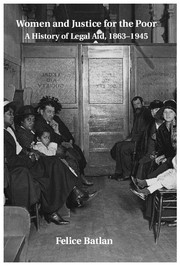Book contents
- Frontmatter
- Contents
- List of Plates
- Acknowledgments
- Abbreviations of Primary Organizations
- Introduction
- PART I A FEMALE DOMINION OF LEGAL AID, 1863–1910
- PART II THE PROFESSIONALIZATION OF LEGAL AID, 1890–1921
- 3 Of Immigrants, Sailors, and Servants: The Legal Aid Society of New York
- 4 Reinventing Legal Aid
- PART III DIALOGUES: LAWYERS AND SOCIAL WORKERS, 1921–1945
- Conclusion
- Index
- Plate Section
4 - Reinventing Legal Aid
from PART II - THE PROFESSIONALIZATION OF LEGAL AID, 1890–1921
Published online by Cambridge University Press: 05 May 2015
- Frontmatter
- Contents
- List of Plates
- Acknowledgments
- Abbreviations of Primary Organizations
- Introduction
- PART I A FEMALE DOMINION OF LEGAL AID, 1863–1910
- PART II THE PROFESSIONALIZATION OF LEGAL AID, 1890–1921
- 3 Of Immigrants, Sailors, and Servants: The Legal Aid Society of New York
- 4 Reinventing Legal Aid
- PART III DIALOGUES: LAWYERS AND SOCIAL WORKERS, 1921–1945
- Conclusion
- Index
- Plate Section
Summary
During the second decade of the twentieth century, male legal aid lawyers gained prominence, and as they did so they sought to move legal aid from local organizations rooted in particular cities to the national stage. These leaders hoped to create a national association of legal aid societies, expand legal aid societies across the country, standardize the provision of legal aid, and generally promote the stature of legal aid. In the process, they tried to reduce and even eclipse women's visibility and their work in the field as lay lawyers and professional lawyers. During this same period, social work was emerging as a distinct profession. Women lay lawyers became strongly associated with social workers, and as a result, at least some of the new men leading legal aid argued that social workers also should have little or no role in its provision. Although the crystallization of these organizing efforts was the publication in 1919 of Reginald Heber Smith's Justice and the Poor, the groundwork was laid in 1911 with the first national conference on legal aid. The ensuing decade saw significant conflict as men sought to redefine the nature of legal aid and lay claim to its foundation. Justice and the Poor, in many ways the culmination of that process, was an imagined history.
As new legal aid societies were established in major cities across the North and Midwest, some male legal aid attorneys experienced an identity crisis. Arthur von Briesen had long imagined a national legal aid organization that would articulate legal aid's history, mission, and policies, and the 1911 national legal aid conference constituted a small first step toward that goal. No women were invited to speak at the conference, nor were women's legal aid organizations represented. This was not an accident. An officer of Boston's Women's Educational and Industrial Union, Carolina Cook, wrote to Briesen asking him whether one of the union's representatives might attend. Briesen replied that he was unaware of the organization, and that Boston was already being represented by the still-young Legal Aid Society of Boston (BLAS).
- Type
- Chapter
- Information
- Women and Justice for the PoorA History of Legal Aid, 1863–1945, pp. 123 - 154Publisher: Cambridge University PressPrint publication year: 2015



